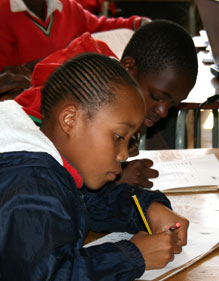|
Getting your Trinity Audio player ready...
|
 There are over 24 000 public schools across South Africa, and in just five months, each one will go to the polls to elect school governing bodies (SGBs) to oversee the running of the schools for the next three years.
There are over 24 000 public schools across South Africa, and in just five months, each one will go to the polls to elect school governing bodies (SGBs) to oversee the running of the schools for the next three years.
From 6 to 28 March 2015 the national SGB elections will take place in a joint effort by the national department of basic education (DBE), provincial education departments and SGB bodies.
“Teachers, support staff, learners and parents are expected to work collaboratively with government to turn schools into thriving centres of excellence,” reads a recent statement by the DBE, announcing the election dates. “These immediate stakeholders in education can organise their contributions to education through the democratically elected SGB.”
Deputy CEO of the Federation of Governing Bodies of South African School (FEDSAS), Jaco Deacon, says the fundamental challenges with regard to SGB elections include the constitutional obligation of every provincial department to publish guidelines on the elections. Logistically this poses problems, because it means there are essentially 10 different sets of regulations on these elections – one national and one each from the nine provinces.
“FEDSAS approached the national department to request a national structure that ensures that elections across the country happen at the same time,” he said. “Three years ago the national elections happened for the first time at the same time.”
Entrenching democratic principles in communities
Matakanye Matakanya, general secretary of the National Association of School Governing Bodies (NASGB), told Corruption Watch these elections are crucial for entrenching the principles of democracy at community level.
“We teach members of the community what democracy is all about,” he said. “We are practicing it through the ballot, by ensuring that we are not imposing leaders on communities, but letting communities elect people who will serve them.”
Deacon agrees: “A school belongs to its community, so it’s important that members of the community decide who should govern it. An elected governor applies what is in the best interest of the school and not just the SGB component that they represent.”
SGBs are made up of the principal of a school, members of staff who are educators, members of staff in support services, parents, and at a high school, learners in grade 8 and above.
Matakanya stressed the importance of learners being involved in the process, because they are the future leaders of these communities. “They must know from a young age the importance of democracy. We have already started with imbizos and mobilising our structures in all the provinces to start campaigning. We speak to SGBs about the upcoming elections and we’ve been at churches as well.
“We’ve also met the MECs of education in KwaZulu-Natal, Free State, the Eastern Cape and Limpopo about publicising the elections. At national level we have engaged the relevant units of the DBE to discuss a plan of action.”
Speedy training is essential for efficient SGBs
SGB elections are no small feat, and Deacon says the elections are a much-needed process that his organisation fought for. At the end of the voting period, over 250 000 SGB members will resume positions and their training will then follow. The challenge here is to determine who is responsible for this training and more importantly, who pays for it.
Training of new members is important and should take place soonest after the elections so that they can go on to carry out their duties from an informed point of view.
“In the last elections, we carried out 120 training sessions within the first six weeks after the polls,” said Deacon. “The most basic but important principle we teach them is that they do not just represent the constituency that voted them in, but the overall interests of the school.”
Matakanya and Deacon agree that the DBE needs to step up to the plate and provide funding for the training of new SGB members.
“We use our own staff members to train SGBs and our member schools’ facilities,” said Deacon. “We don’t charge our members for the training, it all comes out of the member fees.”
“We have told the department that we need the budget to run these elections, given their importance in society,” said Matakanya. “They find a way to raise the budget, because without budget the elections will not be effective.”
Deacon further explained that in terms of the South African Schools Act (SASA), the department can decide to outsource the training function to member associations.
This budget, said Matakanya, could go towards voter education material and to fund the campaigns where members of the community educate parents on how elections work and why they are important.
“T-shirts, pamphlets and billboards that help mobilise communities should be catered for in the budget. Even a person in the furthest village must know that in March next year there will be SGB elections and why they should participate.”
Communities must buy into the notion of SGB elections
“According to the national guidelines for SGB elections, only 15% of a school’s stakeholders need attend to make up the accepted quorum of participants,” explains Matakanya. “In a school with over 1 000 learners, 15% is too small a number to constitute representation.
“It’s a question of coverage. For elections to have the desired effect, people must come out in large numbers to support and participate in the process.”
If stakeholders are limited in terms of coverage in their campaigns, he added, this will not happen. “By the time the day of elections arrives at your child’s school, you as a parent should know what your vote means for that school.”
The NASGB strives for a minimum of 50% participation in elections. “Parents are interested in the education of their children, they are just not aware of the activities that give them the power in that respect.”
What are parents voting for?
The roles and responsibilities of SGBs are stipulated in the SASA. Corruption Watch produced an e-book early this year in which the topic of SGBs is covered. Roles of SGBs in a public school include :
- starting and administering a school fund;
- opening and maintaining one bank account for the school;
- preparing an annual budget and submitting it to parents for approval;
- drawing up and submitting audited or examined financial statements to their provincial departments of education;
- buying textbooks, educational material or equipment for the school;
- paying for services;
- supplementing the funds supplied by the education department (in the case of section 21 schools) by setting, collecting and administering school fees and also other fund-raising efforts; and
- deciding on applications for exemptions from school fees.
Matakanya concedes that SGBs are largely perceived as being there to monitor the financial management of schools. “They are there to protect the mission and vision of the school and adhere to the details of the SASA.”
Corruption Watch will keep a close eye on the election process. Since the start of the organisation’s schools campaign, it has received and analysed data from public reports that suggests that corruption in schools occurs mostly in the procurement of goods or services.
Because SGBs have a financial oversight role, among others, members are often cited in allegations of wasteful expenditure or irregular procurement processes.




